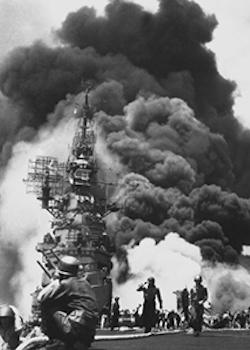The Asia Pacific War and Its Legacy: A Historical Debate

Victory Services Club
Monday 5 October 2015
Memories of the Second World War might be fading, but the legacy of the conflict lives on and is constantly at the centre of domestic and regional debates in East Asia. In an event commemorating the 70th anniversary of the Asia Pacific War, we partnered with the Friendship and Reconciliation Trust to welcome a panel of world experts to engage with the question of how the war connects with the present in the region.
The event was chaired by Alessio Patalano, Senior Lecturer in War Studies at King’s College London. He was joined by Barak Kushner, Associate Professor of Japanese History, University of Cambridge, Rana Mitter, Professor of the History and Politics of Modern China, University of Oxford, and historian and journalist Francis Pike.
The panel highlighted the fact that the Second World War is still seen primarily as a European conflict. History books remain weighted heavily in favour of the war in Europe, despite the fact that the War in the Pacific took place on a scale five times greater and accounted for 50% of the total deaths and causalities. Further, the panel welcomed the opportunity to recognise that the War in the Pacific centred not only on Japan and America, but also on China. Rana Mitter spoke on the vast scale of China’s suffering, where 80 to 100 million people were displaced and fourteen million killed; the destabilising effect of the Japanese invasion led directly to Mao’s aggressive take-over.
Discussion centred on the fact that war-related issues remain a major obstacle for Japan in its key relations in East Asia and the idea that interpretations and understandings of history evolve over time.
In post-war Japan, both geography and Cold War politics pushed against proper reflection, making comparisons with Germany problematic. Japan didn’t share Germany’s proximate pressure from occupied countries and didn’t resume diplomatic relations with its neighbours until decades after the war. Further, it wasn’t allowed to conduct its own trials, which were dictated by American Cold War foreign policy, and America’s decision to re-racialise all countries in East Asia resulted in a homogenous Japan, dealing only with itself. Japan didn’t consider its war responsibility at the time, and now young Japanese are tired of apologising for something they weren’t involved in.
In post-war China, the domestic situation prevented any kind of consideration of the conflict. The majority of the fighting and dying in China took place in Chongqing, the Nationalist heartland. Following Mao’s take over, Nationalist leader Chiang Kai-Shek became the enemy, and any contribution made by the Nationalist Government to winning the war couldn’t be mentioned. When China re-emerged internationally in 1980 it was to find that Japan was booming, and with both Chiang Kai-Shek and Mao dead, and the possibility of reunification with Taiwan, this seemed a good time to remind Japan of its crimes.
Discussions of the Pacific War typically centre on Japan’s supposed lack of contrition for its actions. This was particularly topical given Abe’s recent statement marking the anniversary of the war, and the on-going lack of a solution between Japan and South Korea over the comfort women issue frustrating the likelihood of a summit between the two countries. Barak Kushner pointed out that Japan had in fact apologised on several occasions for its actions, and that as a democracy with a plurality of voices, it is to be expected that there will be not only a left wing and a progressive wing but also a harassing and haranguing right wing. In his speech Abe had taken a moderate approach and avoided stoking domestic and international tensions. However, Barak suggested that if he had come out with a stronger apology he could have taken the wind out of China’s sails. With regard to the possibility of Obama visiting Hiroshima, it was agreed that acknowledgements that suffering has been caused need not necessarily involve an apology, and that this might provide one way of moving forward in the region generally.
Dr Patalano closed the discussion by affirming that bringing different versions of history together to confront each other is a valuable starting point in looking to the future. The point has also been proven that if you put historians together on any panel, you will never come up with solutions, but more problems than you started with.

